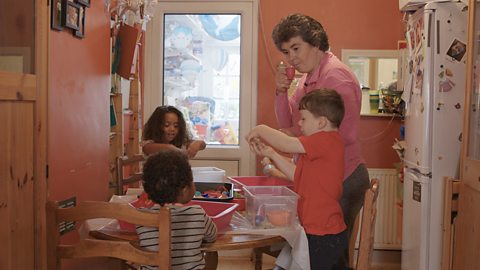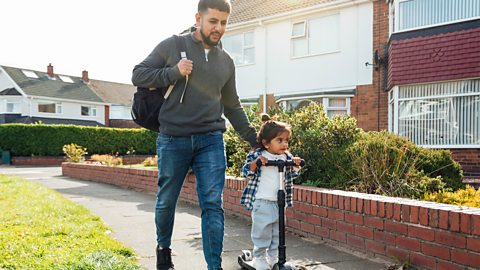If your child is starting in childcare soon, you might be considering a childminder instead of a nursery or playgroup.
But what do childminders actually do? And how can they support your child's learning?
We spoke to Sinthuya and Lisa about their work as childminders and what parents should be considering when looking for one.
It’s some green and blue and red and orange spaghetti.
My name is Sinthuya and I’m a registered childminder in England.
As a childminder, I look after children in my home 8am until 6pm everyday.
It’s such a privilege watching the children grow and develop.
My aim is to nurture a very close personal bond to help a child’s learning and development.
We aim to do different activities everyday.
My home environment means that the children can enjoy real life experiences in small groups.
And I support areas like language development through singing, creative play and storytelling.
(Sings) Row, row, row your boat, gently down the stream. Merrily, merrily, merrily, merrily, life is but a dream.
People say “oh, you’re just a childminder”, but we operate under the early years foundation stage framework, just like nurseries, and we provide the same early years education.
We deliver quality childcare in a safe and fun environment, and we work really hard to nurture the children in our care.
Each child has a learning journal where I record what they’ve done, their achievements and how far the children are in their development.
Every six weeks we review the child’s progress and I tailor their learning to their individual level.
I also send photos to the parents everyday to show their child responding to activities
To become a childminder in England, you have to register with OFSTED or a childminding agency, and at the very minimum, complete training courses in First Aid, food hygiene and safeguarding.
Many childminders have further qualifications. For example, I’m a qualified teacher.
We do similar activities to other early years settings, but we tend to look after smaller groups of children.
This means we can pick up on any behavioural changes or developmental delays really quickly, because we know the children so well.
We become an important part in each others’ lives.
The best thing about my job is it allows me to continue early years teaching, which I love.
What is a childminder?
Childminders are professional carers who look after children in their own homes. They will have undergone inspections as well as basic training and first aid courses.
They look after children from babies up to school age and often beyond as they start school.
Their hours are more flexible than a nursery. They may only work during school term times or offer slightly shorter hours. This will vary though, so you’ll need to find a childminder with working hours that fit in with yours.
There are limits to the number of children a childminder can watch at one time, and they usually set their own hours and rates.
We deliver quality childcare in a safe and fun environment, and we work really hard to nurture the children in our care.
One of the main advantages of using a childminder is that your child will be one of a small group. This means they'll have plenty of individual attention, and their activities can be tailored to their needs.
It also means childminders can pick up on any behavioural changes or developmental delays really quickly because they know the children they work with so well.
Childminders might be able to send you photos of your child every day to show how they're progressing and enjoying the activities.
Hi, my name’s Lisa. I’m a registered childminder and I’ve been doing this job for 24 years, and I absolutely love it.
[To children] Morning! In you come, in you come.
I look after children age ten months to ten years.
I love the fact every day’s different.
[To children] Do a big roar… Roar!
Here are my top questions you should ask when meeting a childminder for the first time.
First question should always be, how do you ensure the safety of the children?
Every childminder has to be registered either with OFSTED or with a childminding agency.
That proves they are following requirements on ratios and gives you the reassurance of regular inspections.
You should also check they have the appropriate insurance in case anything goes wrong.
You can also ask how long they have been childminding and what training or qualifications they have. It’s always good to know their background, and their approach to teaching, and how they communicate a child’s progress.
[To children] Oh, thanks Mr. Leon. That’s beautiful.
They may have a particular interest or expertise in an area, such as language development, which is worth knowing.
My big thing is getting kids outdoors, but it could be other activities, like music, arts, crafts or cooking.
Check their opening hours, so you can make sure that they fit with your schedule.
[To children] Shall we count them? Ready… One, two, three, four, five.
Ask what they provide. It might be cooked meals, cold meals or bring your own.
You may need to check whether they can cater for allergies.
You may need to know what happens if your childminder is sick. Do they have an assistant who can help? Also, what happens if your little one is sick in their care.
What is their holiday policy? Everyone needs a break and your childminder will very much deserve one!
What does that say? Louis… That’s your name!
Childminding is such a rewarding job. If you ask what they love about it, you should see that passion shine through, and this will help you decide whether it’s the right setting for you child.
High five!
What questions should I ask a childminder?
How do you ensure the safety of the children?
Every childminder has to be registered either with OFSTED or with a childminding agency.
That proves they are following requirements on ratios and gives you the reassurance of regular inspections.
You should also check they have the appropriate insurance in case anything goes wrong.

What experience do you have?
Ask how long they have been childminding and what training or qualifications they have.
It’s always good to know their background and their approach to teaching, and how they communicate a child’s progress.
They may have a particular interest or expertise in an area, which is worth knowing.
What are your opening hours?
Some childminders start early, and others will stay open late. Make sure their hours fit with your schedule.
You will also need to find out if they are available to collect from your specific nursery or school.
What types of meals and snacks do you provide?
Some childminders provide meals, whilst others prefer parents to provide packed lunches whilst they supply snacks.
You may need to check whether they can cater for allergies.
What happens if they're sick?
Do they have an assistant who can help?

What is your holiday policy?
Everyone needs a break, and your childminder deserves one every now and then. But how often do they take breaks? And does that fit with your schedule?
You can check your local government website or use a search engine to find out your eligibility for free child care hours.
- - 30 hours for 38 weeks if taken in term time
- - 30 hours a week if taken in term time
- - 30 hours a week made up of 10 hours early education and 20 hours childcare
- - 12.5 hours a week during term time
If you have a child with special needs and or a disability you might want to ask your childminder if they have training and you could check your local government website for access to possible funding.
Find out more about picking a childcare option that suits your little one with these tips from educational psychologist Dr Alison Gurney.






